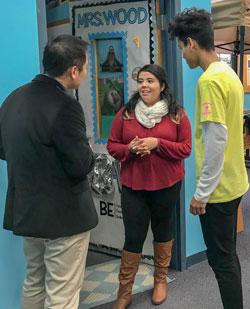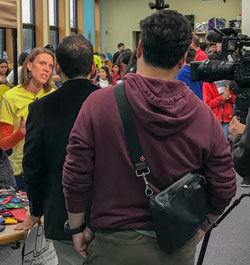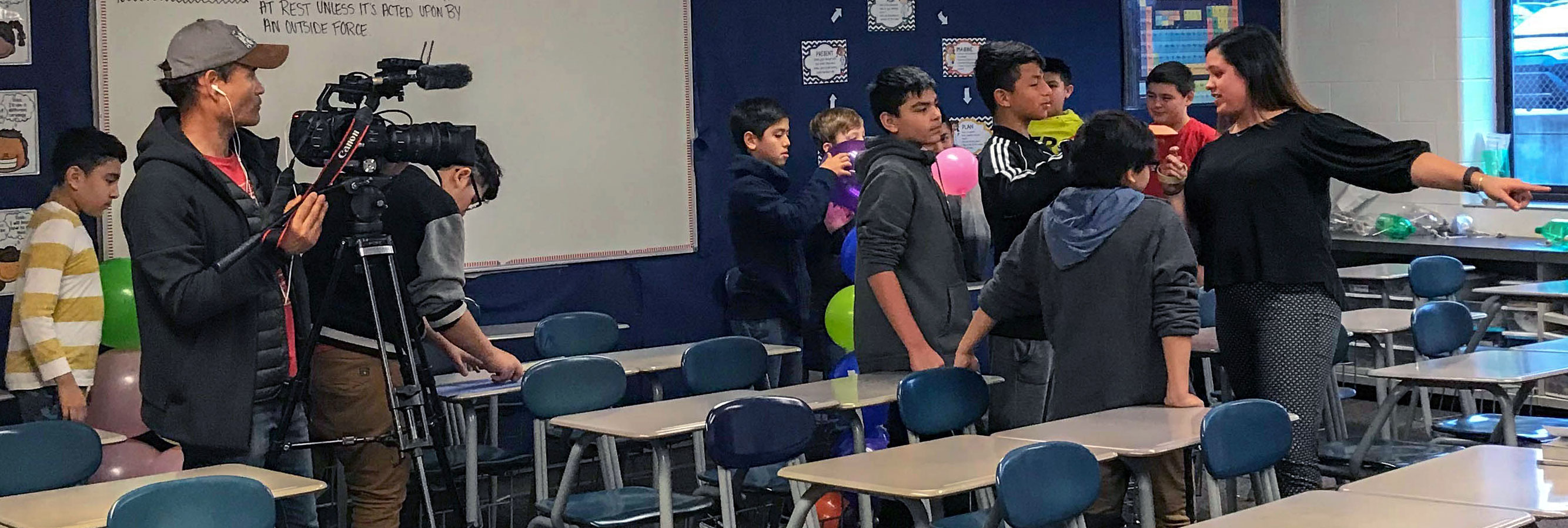The district received some international attention this month when a film crew from South Korea shot a segment for an upcoming documentary at Lee Middle and High School.
South Korea’s Educational Broadcasting System, a television and radio network that is analogous to Public Broadcasting Service in the U.S., is creating a three-part series that will air later this year called “The Future of Education.”
Felix Kwon is an international reporter and researcher who worked on the documentary for EBS.
“We had such a wonderful time (at Godfrey-Lee),” he said. “When we talk about future of education, we always think of high-tech, coding, programming — that more techy stuff, right? But I don’t think that’s everything about the future of education. Tech stuff can be helpful, but there are some other elements that we need to prepare the next generation.”

Seeing the “Cs” in Action
Kwon found those elements at Godfrey-Lee, which was recommended to him by Roberta Michnick Golinkoff and Kathy Hirsh-Pasek, co-authors of “Becoming Brilliant.” The book lays out principles of education known as the “6Cs” (collaboration, communication, content, critical thinking, creative innovation, and confidence). Godfrey-Lee has adopted these principals throughout the district.
Kwon and the crew filmed an English Language Arts class, a Spanish market created by students in the media center, and a seventh-grade STEAM class.
“It was a wonderful experience,” said Carol Lautenbach, assistant superintendent of teaching and learning design for Godfrey-Lee Public Schools. She appreciated how the questions from the interviewers helped school staff clarify and articulate what they’re doing.
“It helps you think through the decisions that have been made, and think about why you’re doing what you’re doing. The team was very interested in hearing the ‘why.’”
EBS interviewed Lautenbach, Superintendent Kevin Polston, Board of Education President Eric Mockerman, and teachers Kim Plum and Katherine Merriott.

Education Innovation
Kwon said that in South Korea, almost every primary school is public, and falls under the ministry of education.
“In some senses, it’s a very good model. Wherever you are, you get equal funding under the ministry of education,” said Kwon, noting that you wouldn’t see huge disparities in the educational system from one region to another.
However, he said, some things about the uniform nature of the educational system can act as a barrier when it’s necessary to act fast and tailor teaching to the students and the changing employment landscape.
Kwon said that education often focuses heavily on artificial intelligence, coding and technological advances that rely on costly devices. While Godfrey-Lee has incorporated technology where necessary, he said, they’re preparing the next generation overall by adapting the curriculum to apply the 6Cs and project-based learning, which is an innovative way of educating.

“At Godfrey-Lee, they’re really trying to build on the students’ perspective,” said Kwon. “More than 75 percent of students there are receiving free or reduced lunch. Still, in that environment, they’re seeing very dramatic results. It’s pretty impressive.”
Godfrey-Lee staff will get a chance to see the documentary when it airs, with English subtitles.
Lautenbach said that gaining international interest in what the district is doing has been an honor. The students were excited to participate.
“It was a pretty good feeling to show them what it is we’re trying to create here — a joyful learning experience,” she said.
Related Articles:










